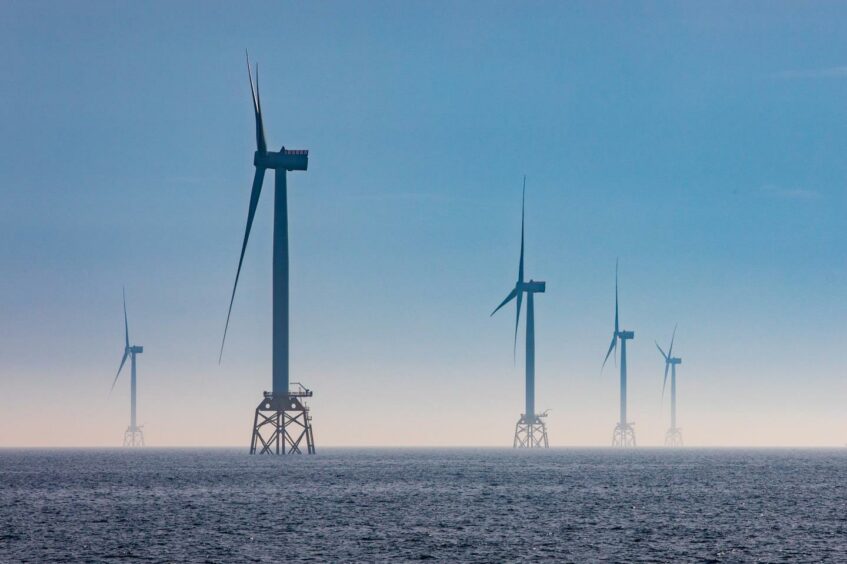
A new initiative has been launched to help enable the coexistence of offshore wind farms with a thriving marine environment.
The Crown Estate, which manages the seabed around England, Wales and Northern Ireland, is partnering with a range of UK-wide expert bodies to develop three research projects.
To support the goals of the study more than £12 million is being invested through the Offshore Wind Evidence and Change programme.
Led by Natural England, Scottish Government and the Royal Society for the Protection of Birds, the projects will be delivered and supported by a range of public, private and charitable organisations.
They aim to delve into a range of environmental issues in order to identify evidence-gaps and inform key decision making around how offshore wind deployment could affect marine habitats and wildlife.
The projects comprise:
- POSEIDON (Planning Offshore Wind Strategic Environmental Impact Decisions) – led by Natural England, the four-year project will improve the knowledge of environmental risks across UK waters and provide tools for future offshore wind planning.
- PrePARED (Predators and Prey Around Renewable Energy Developments) – a four-year partnership led by Scottish Government’s Marine Scotland directorate and co-funded by Crown Estate Scotland aimed at helping to improve understanding of how seabirds, marine mammals and fish respond to offshore wind farms.
- Remote Tracking of Seabirds at Sea – the Royal Society for the Protection of Birds will harness novel tracking techniques over a five-year period to fill critical knowledge gaps in the movements and populations of seabirds, such as puffin and kittiwake.
The Offshore Wind Evidence and Change programme is being delivered in partnership with the Department for Business, Energy and Industrial Strategy (BEIS), and the Department for Environment, Food and Rural Affairs (Defra).
So far, 25 projects have been awarded funding, with three completed and 13 underway.
They are gathering data and evidence that will help to find space in a busy seabed, enable better understanding of how offshore wind affects the environment and habitats, and inform decision making and understanding around environmental benefits and provision of compensation.
Dan Labbad, chief executive of the Crown Estate, said: “As we face the twin crises of biodiversity loss and climate change, protecting our natural world has never been more important.
“As managers of the seabed around England, Wales and Northern Ireland, we play a vital role in helping to safeguard our precious marine environment whilst shaping, innovating, informing and enabling the development of offshore wind for the long-term benefit of the nation.
“This investment, delivered in partnership with expert stakeholders, is the latest example of our continuing drive to provide world class data and evidence to support both government and the industry in making the best decisions to unlock the pathway to net zero, in harmony with healthy, biodiverse seas.”
Minister for Energy Greg Hands said: “This research will help protect our precious coastal and marine environments as we continue to grow the delivery of clean, renewable energy for consumers and open opportunities for green growth and high-quality jobs.”
Environment Minister, Rebecca Pow, said: “These collaborative projects supported by The Crown Estate investment will provide vital information about the environmental impact of the offshore wind industry, helping to inform the industries development and our associated net zero commitment whilst at the same time protecting the precious marine habitat.
“Working across government, with industry and the range of expert bodies in the UK, we are committed to achieving sustainable offshore wind development while ensuring we protect our vital populations of seabirds, marine mammals and fish and the habitats that support them around our coasts.”
Michael Matheson, Scotland’s Cabinet Secretary for Net Zero, Energy and Transport, said: “I welcome this important partnership with The Crown Estate which will help in our efforts to safeguard the marine environment as we continue to grow the offshore wind capacity for a cleaner greener future.
“The PrePARED project will, for the first time, concurrently study predator, including seabird and marine mammals, and prey distribution and behaviour in and around offshore wind farms in Scotland providing critical insight into cumulative effects from large scale offshore wind development for key species.
“By bringing together expertise from government, academia, nature conservation agencies and industry, the PrePARED project will address critical knowledge gaps that are barriers to the sustainable offshore wind development which is instrumental in helping meet the Scottish Government’s renewable energy targets and reach net zero emissions by 2045.”
An emerging issue
As the number of turbines in UK waters increases, questions are increasingly emerging around how best to allocate space.
Norwegian energy giant Equinor is carrying out a study at its Hywind Scotland development, off Aberdeenshire, to better understand how offshore wind and fishing can interact.
Meanwhile one of the consortia bidding in the ScotWind leasing round has committed to exploring the environmental impacts of floating turbines.
If they are awarded acreage, Orsted, Falck Renewables and BlueFloat Energy will work with the Scottish Association for Marine Science (Sams) on a range of topics.
Recommended for you

